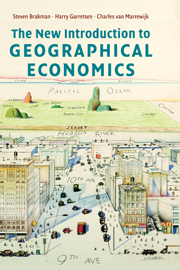Book contents
- Frontmatter
- Contents
- List of figures
- List of tables
- List of boxes
- List of technical notes
- List of symbols and parameters
- Preface to the new edition
- Acknowledgments
- Part I Introduction
- 1 A first look at geography, trade, and development
- 2 Geography and economic theory
- Part II Core models and empirical evidence
- Part III Applications and extensions
- Part IV Policy and evaluation
- References
- Index
2 - Geography and economic theory
- Frontmatter
- Contents
- List of figures
- List of tables
- List of boxes
- List of technical notes
- List of symbols and parameters
- Preface to the new edition
- Acknowledgments
- Part I Introduction
- 1 A first look at geography, trade, and development
- 2 Geography and economic theory
- Part II Core models and empirical evidence
- Part III Applications and extensions
- Part IV Policy and evaluation
- References
- Index
Summary
Introduction
The central message of chapter 1 is that geography is important. Economic activity is not evenly distributed across space. On the contrary, clustering of economic activities can be found at various levels of aggregation: the considerable variation in economic size of cities or regions at the national level, or the uneven distribution of wealth and production at the global level. The question arises, of course, as to why location seems to be so important for economic activities. To answer this question, we need an analytical framework in which geography plays a part one way or another. In particular, we would like to show that the decisions of economic agents are partly determined by geography, and that they provide a framework in which the geography of the economy itself can be derived from the behavior of economic agents. This, in a nutshell, is what the approach developed in this book tries to do. We want to make absolutely clear from the start that this approach, referred to throughout this book as geographical economics but also known as new economic geography (see the preface), is by no means the first theory to address location issues. There is a long tradition that deals with the questions to be discussed in this chapter. The novelty of geographical economics as such is mainly in the way it tackles the relationship between economics and geography.
- Type
- Chapter
- Information
- The New Introduction to Geographical Economics , pp. 32 - 78Publisher: Cambridge University PressPrint publication year: 2009



